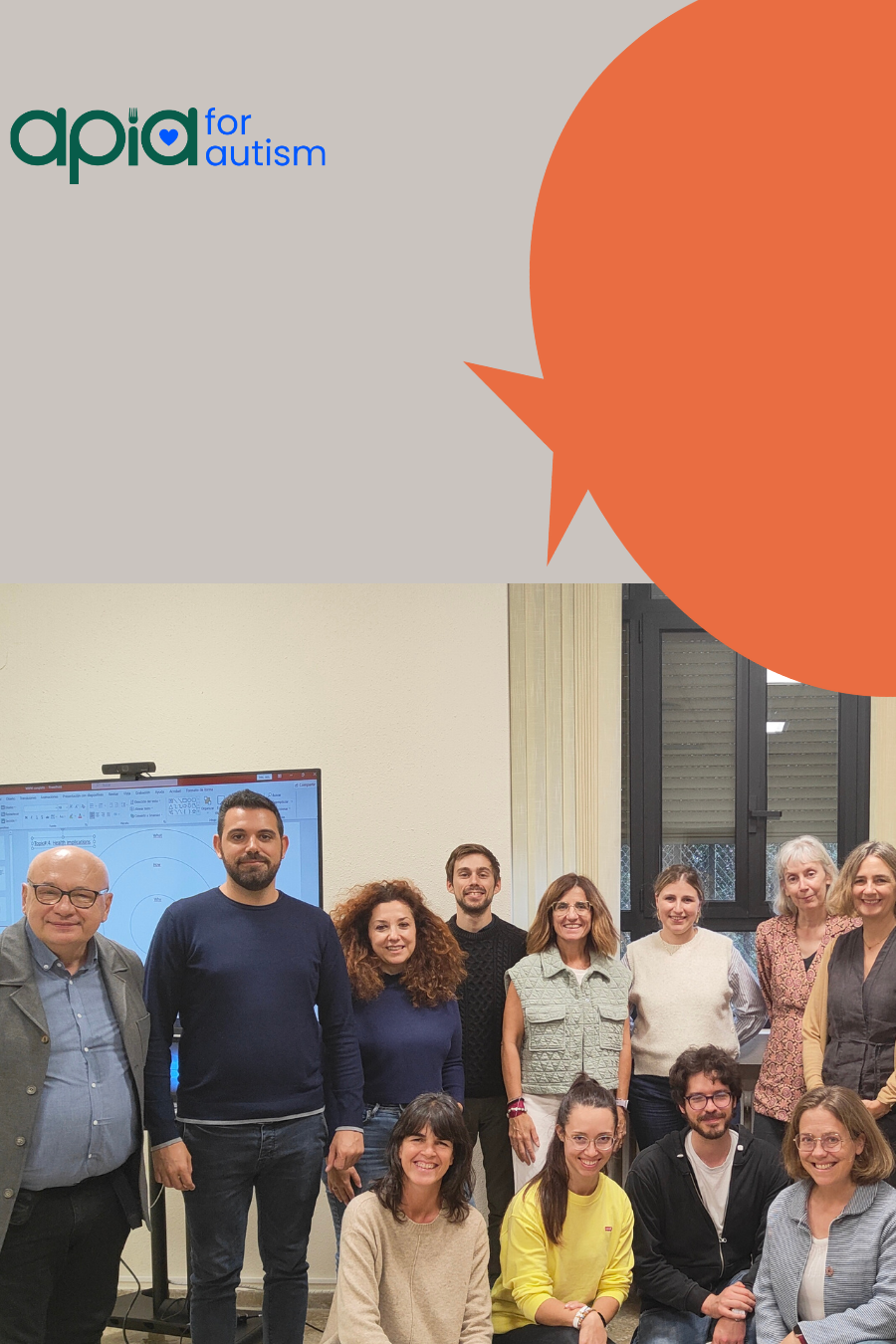Our news
The first year of the APIA project
The APIA project was launched on 31 December 2023 and will run for 36 months, until 31 December 2026. Its main objective is to develop tools to support professionals and relatives of adults with autism through an adapted approach to nutrition, aimed at promoting their autonomy, social inclusion and well-being.
The project brings together five European partner organisations: UNIZAR – University of Zaragoza (Spain), CADIS Huesca (Spain), A18onlus Fondazione per l’autismo (Italy), Think tank PLS-Pour La Solidarité (Belgium) and Les Insatiables (France). These partners are working together to co-create theoretical and practical tools on adapted nutrition for severely autistic adults, with a focus on both nutritional and behavioural aspects.
Towards the development of a theoretical and methodological guide
The work presented below – literature review, DELPHI and functional analyses, qualitative and quantitative surveys – will lead to the creation of two complementary deliverables.
The theoretical guide will propose practical, evidence-based recommendations for improving nutritional support for adults with autism, taking into account their specific sensory characteristics and eating behaviours.
The methodological guide, for its part, will provide professionals and carers with practical tools for incorporating these recommendations into their day-to-day practice.
In order to bring this ambitious project to fruition, the first year of research, surveys and analyses will serve as a theoretical basis for identifying the key issues and guiding the next stages of research and intervention.

Literature review: Identifying the nutrition information deficit in adults with autism
January – April 2024
The aim of the literature review is to identify and analyse existing data on the nutrition of people with autism, in relation to their sensory perceptions, eating disorders and the implications for their physical and psychological health. People with autism often face specific nutritional challenges, linked in particular to sensory hypersensitivities or hyposensitivities that influence their food choices. Eating disorders, such as neophobia or food selectivity, are common concerns and can affect their general well-being.
In addition to these aspects, the literature review provides an inventory of data on the specific nutritional needs of people with autism. It includes an analysis of the diets and nutritional interventions that have been tested, and their results. The methods used to implement these diets are also examined, providing an understanding of the practical challenges associated with their implementation. The review shows that there is a lack of data on adults with autism, particularly in relation to the last three themes (see themes 5, 6 and 7 of the literature review), which cover dietary intervention strategies, eating behaviours and quality of life.
DELPHI analysis: Prioritisation of themes by professionals
April – august 2024
The DELPHI analysis, carried out jointly by PLS and UNIZAR, involves consulting health professionals to rank the themes identified in the literature review in order of importance. This approach will enable priorities to be prioritised in the theoretical tool, which will bring together information on the diet of people with autism (behavioural and nutritional issues, advice, solutions, etc.) to support professionals and family carers. This iterative approach enables a consensus to emerge among the experts, ensuring that priority needs are addressed first.

Qualitative survey: Exploring the practices and needs of professionals and family carers
April – may 2024
The qualitative survey, led by PLS and disseminated by the consortium, is a key tool for gaining a deeper understanding of current feeding practices for people with severe adult autism. It aims to interview professionals and family carers about the way they manage food and the challenges they face. The aim is to explore themes 5, 6 and 7 of the literature review, relating to dietary interventions, the foods to choose for a balanced diet and strategies for improving the quality of life of people with autism. The results of this qualitative survey will then be compared with the trends identified in the functional analysis, described below.

Functional analysis: Observing the eating behaviours of adults with autism
April – august 2024
Functional analysis, developed and conducted by A18onlus in collaboration with CADIS, observes the eating behaviours of adults with autism before, during and after meals. This method provides a better understanding of how their sensory perceptions and eating disorders influence their day-to-day eating. The data is enriched by the Glasgow Sensory Profile, which assesses the sensitivity of people with autism to various sensory stimuli, supplemented by information on meal frequency and the dietary profile of the individuals observed.

Quantitative survey: Validation of needs identified on a larger scale
End may – august 2024
The final stage consists of a quantitative survey, distributed after the results of the qualitative survey have been collected and analysed, which confirms the information and trends identified previously on a larger sample. Also constructed by PLS, this survey aims to validate the priority needs in terms of nutritional intervention and diet for people with autism, with a comparison to the results of the DELPHI analysis.

This combination of qualitative and quantitative approaches ensures that the final recommendations are based on an in-depth understanding of current practices and statistical validation of the needs identified. The data obtained will be used to finalise the basis for the theoretical and methodological guides, ensuring that the recommendations are in line with the expectations and needs of professionals and carers.
Follow us on our social networks to find out when the first results are published!
Les Insatiables
PLS – Pour la Solidarité
More news


